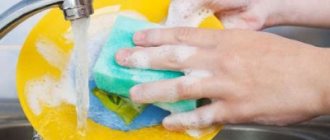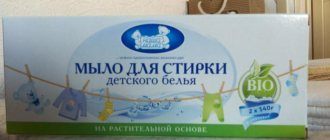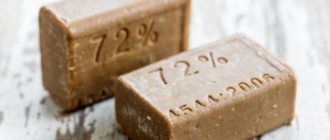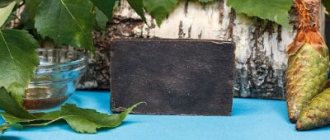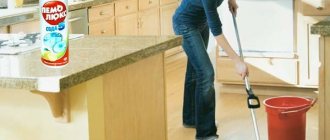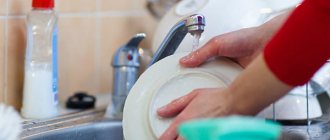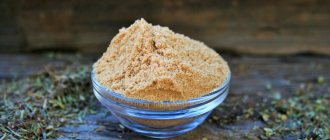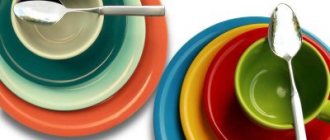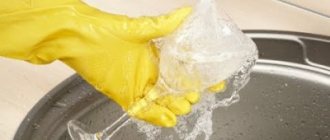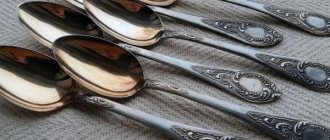The civilization of mankind has brought into life a lot of promising, useful, time- and cost-effective labor, however, not everything is so positive. Pessimism, of course, is also inappropriate. Our World is multifaceted, colorful, amazing and it is a pleasure to live in it, but everyone would like it to be longer and of better quality. To do this, it is advisable to have some available information.
A person eats every day, this is just as important as washing dishes after eating. The issue of the safety of detergents for this purpose has been discussed recently. People now have access to new knowledge that they would like to share.
What does laundry soap consist of?
Before replacing your usual detergent compositions with soap, you need to find out what is used in its manufacture. It is produced in accordance with GOST standards and contains only natural ingredients, without the addition of phosphates and surfactants. This is a significant difference from most dish gels.
The soap contains natural fats, plant oils and sodium salts. The product, prepared according to the classic recipe, does not include fragrances, dyes or preservatives.
High-quality laundry soap has an antibacterial and cleansing effect and does not cause allergies.
Pros and cons of using soap gel
Products based on laundry soap have the following advantages:
are easily washed off from the surface of the dishes without leaving a toxic film;- have a natural composition and do not contain strong allergens;
- have antiseptic properties, suitable for everyday disinfection of household items and surfaces;
- are characterized by economical consumption and low cost;
- Due to the absence of chlorine, they do not harm the environment.
The disadvantages of laundry soap include the following aspects:
- the product dries out the skin greatly;
- in cold and hard water, soap foams worse, rinses off and dissolves fat (for example, whitish stains may remain on glassware);
- complex stains require preliminary soaking in a soap solution and the use of an abrasive.
The absence of aggressive surfactants, dyes and fragrances reduces the risk of allergic reactions, but does not completely eliminate it, so before using the product you need to test on a small area of skin.
Disadvantages of laundry soap
Laundry soap dries out the skin, so you need to wear gloves to wash dishes with it.
Despite the fact that this product has a lot of advantages and is made entirely from natural ingredients, it has disadvantages. When used to clean kitchen utensils, it should be rinsed thoroughly as sodium chloride is not always safe. Its entry into the digestive system is undesirable.
Soap greatly dries out the top layer of skin on your hands, so you need to use gloves or mix it with a small amount of glycerin before use.
Due to the high hardness of tap water, it may not lather well. In order to increase the amount of foam, you should prepare a mixture of laundry soap and soda. This is necessary so that the fatty acids contained in the composition do not lose their properties. You need to mix the ingredients in approximately the same proportions, that is, 200-250 grams per bar. powder.
However, all the disadvantages are offset by the advantages. They are easily removable, so you can clean dishes with laundry soap without any health hazards.
There is no need to rush to buy liquid soap. Often, it is united with its “solid brother” only by its name, and contains only chemical components. Of course, it can be used for washing, but this product is not suitable for washing dishes.
It is better not to use white soap for cleaning kitchen utensils, as it may contain dyes or other additives.
Other variations based on a mixture of soda and laundry soap
Depending on your preferences, soda paste can be improved by supplementing it with various additives:
- Add ten drops of any essential oil of your choice to the already prepared mixture. As a rule, it is lemon, jasmine or tea rose.
- Dissolve three tablespoons of mustard powder and 30 grams of ammonia in a glass of water. Add the resulting mixture to the soda paste. This will provide you with additional disinfection and, therefore, a better effect when washing dishes. Mix these ingredients only with the windows open.
The prepared pasta should be stored, as is customary, in tightly closed containers. It perfectly washes, cleans, disinfects and, in fact, copes with almost all types of contaminants. On top of everything else, its preparation does not require any special physical or material effort.
How to wash dishes with soap
To make detergent from laundry soap, the bar must be grated.
Before use, the bar must be grated. Mix the resulting shavings with water. You can simply soap the sponge and scrub the dishes with it.
The washing procedure is very simple and does not differ much from cleansing with special products. To do this you need:
- Take a small basin or close the sink with a stopper.
- Pour warm or hot water into a container.
- Add a little baking soda to soften it. This is necessary to increase the volume of foam, the effectiveness of soap and reduce the number of streaks and drips on washed kitchen utensils.
- Wash all items using a regular sponge or cloth.
- Rinse under the tap or in clean water, having first collected it in a basin. It is important to completely remove the soap solution. If you rinse dishes in a container, you need to change the water more often or repeat the procedure several times for better effect.
Before washing, any remaining food and traces of fat from kitchen utensils must be removed with a napkin.
Using soap, you can get rid of carbon deposits on the surface of a frying pan or pot. To do this, take water and add a little grated soap, boil and leave to cool. Then wash as described above. The carbon deposits should come off easily.
TOP 3 best products
When choosing dish soap, you should pay attention to the following products:
Tavinka Mustard
Tavinka “Mustard” dishwashing soap is an environmentally friendly product, hand-brewed . Castor and olive oil, citric acid, mustard powder and sodium salts of fatty acids wash away any dirt in cold water without leaving any residue.
Soap has an antibacterial effect. After use it does not leave streaks on glassware. Allowed for processing children's dishes, washing vegetables and fruits. The average cost is 330 rubles. (set of two bars). Read reviews here.
Bereginya
Bereginya laundry and dishwashing soap consists exclusively of natural ingredients that ensure the safety of using the product. Salt, soda and mustard quickly dissolve fat and remove stubborn dirt.
Lemon essential oil disinfects surfaces and eliminates unpleasant odors. Castor and grape oils care for the delicate skin of your hands. Soap is an organic product, completely decomposes, and does not pollute the environment. The average cost is 175 rubles. (for 1 piece). Read reviews here.
Pure coconut Mi&Ko
Mi&Ko “Pure Coconut” laundry soap is one of the best natural dishwashing detergents. The soap foams well, removing grease, food debris and other contaminants from the surface of plates, spoons, cups and pots without leaving any residue.
The absence of dyes, fragrances and other synthetic components protects the delicate skin of the hands from irritation even during prolonged contact with a soap solution . The soap is washed off without residue and does not leave streaks on glass surfaces.
The average cost is 110 rubles. (for 1 piece). Read reviews here and here.
You need to smell the soap before purchasing. A sharp, unpleasant odor indicates low quality of the product.
Can I use baby soap for washing dishes?
To wash dishes, you need to choose hypoallergenic baby soap.
As in the manufacture of any other soap, triglycerides and oils of plant origin are used as the basis for baby detergent. However, many unscrupulous manufacturers also add chemicals that can cause allergies or harm health if they enter the stomach.
It is better to wash dishes with safe products. Each of them has its own pros and cons - the main thing is to assess the risks and make the right decision. Therefore, when choosing baby soap to clean dishes, you need to pay attention to its composition. If it contains harmful chemical elements, you should refuse the purchase.
Soap made from natural ingredients can be safely used to clean dishes and other kitchen utensils. You can also use formulations marked “hypoallergenic” on the packaging.
Can it be washed?
More and more housewives prefer a safe means of caring for kitchen utensils - soap. Which of the large number of types of this detergent can be used in the kitchen, and which one is better to avoid?
Economic
Laundry soap is an excellent alternative to traditional household chemicals. Its main advantage is its exclusively natural composition .
Vegetable oils, animal fats, alkali sodium hydroxide react with water to form a large amount of foam, which effectively cleanses any, even very old, stubborn dirt.
Laundry soap is allowed not only for washing dishes, but also for treating accessories for small children and food (vegetables, fruits).
The more fatty acids in the soap (the indicator is indicated as a percentage on the bar), the faster it will be possible to clean dirty dishes. High-quality laundry soap is a brown bar, without cracks, sticky traces , with a characteristic specific odor (without extraneous “aromas” of rancid oil or fish).
Degtyarny
Tar soap, like laundry soap, contains a large amount of fatty acids and alkali. Birch tar gives it special bactericidal and antiseptic properties. Tar soap helps quickly restore shine and shine to dishes.
The completely natural composition gives confidence in the safety of using this detergent. Even if a small amount of soap solution remains on the dishes, it will not cause any harm to the body.
The only reason why many people refuse to use tar soap for washing dishes is the specific smell. But this problem can be successfully solved by repeated rinsing under running water.
For children
Baby soap consists of 80% saponified fatty acids, which explains its excellent cleaning properties . The natural composition, minimal amount of fragrances and dyes allow you to use baby soap for daily treatment of children's accessories and dishes.
The only negative is that in cold tap water, baby soap practically does not foam, does not dissolve fat well, and is not completely washed off (leaves whitish stains on the surface).
Liquid
Liquid hand soap contains a sufficient amount of antibacterial and antifungal components that can disinfect the surfaces of kitchen utensils.
In addition, the plant components in this product help keep the skin of your hands soft and velvety .
But even with such positive properties, liquid soap should not be used for washing dishes. The thing is that this product contains many chemical non-food components (fragrances, dyes), which, even with very thorough rinsing, remain on the surface of the dishes, and later enter the body along with food.
Toilet (for hands)
Bar hand soap can be a relatively safe dishwashing product, provided that it contains a minimum amount of fragrances and dyes.
The disadvantage is that it is not able to break down large amounts of fat (dirty frying pans, pots and baking trays will remain dirty).
Special
Special soap is a detergent that contains medicinal and disinfecting components. Special or medical soap, as it is also called (vaseline, lanolin, carbolic), cannot be used for washing dishes, since it is not completely washed off from surfaces and, if ingested, can cause poisoning and diarrhea.
The benefits and harms of chemical detergents
Gels and dishwashing liquids are convenient because they easily remove grease, even old ones. But this undoubted advantage is not accidental. Almost every product contains surfactants. Surfactants help to quickly clean kitchen utensils, but at the same time form a tension film. It is not visible to the naked eye, and it is quite difficult to wash it. This will require at least 10-15 rinses.
If it was not possible to remove surfactants from the dishes, the remaining substances, together with the next meal, end up in the gastrointestinal tract and gradually accumulate in the body. This can cause many diseases.
Unpleasant health consequences can be avoided if you know how to choose the right dish gel.
How to choose dish detergent
Based on their composition, washing liquids are divided into organic and inorganic. The former are safer because they contain substances that decompose without residue when washed and are of plant origin. In addition, natural remedies:
- do not cause damage or violate the integrity of the skin;
- do not cause allergies;
- are completely washed off the dishes and do not leave harmful substances on them.
However, they are significantly more expensive than inorganic ones, but are more concentrated, so they are consumed very slowly. Eco-products are made without the addition of phosphates, surfactants, coloring elements and flavors. The scent is created based on natural ingredients: citrus extract, vinegar or essential oils. You can distinguish organic detergents using o.
All inorganic formulations contain surfactants. To purchase, you should choose those where the percentage of such substances does not exceed 5. At this concentration, the risk of harmful effects is reduced.
When buying inorganic detergents, you can never be completely sure that the composition used is harmless.
Composition and properties
The composition and quality of soap are regulated by GOST 30266-2017. According to this standard, it can only contain :
- fatty acid salts,
- water,
- alkali,
- soda and unsaponifiable substances.
To improve technical characteristics, it is allowed to add rosin, kaolin, soap stocks, titanium dioxide, etc.
Soap components and their effect on dishwashing:
| Name | Content | How does it affect |
| Animal, vegetable and synthetic fats (including technical lard) | 64-72% | Provides dissolution of fat and food residues |
| Soda (proportion of free component in the finished product) | Up to 1% | Increases soap effectiveness and promotes foam formation in cold and hard water |
| Alkali (caustic soda) | Up to 0.15-0.20% | Accelerates the dissolution of fats, food residues, soot Soda and alkali are saponifying components |
| Sodium chloride, table salt | Less than 0.1% | Added for technical purposes to separate the soap core during the cooking process |
| Kaolin (clay) | Less than 0.5-1% | Reduces the drying effect of alkali on the skin |
| Rosin | Less than 0.5% | Improves the solubility of soap in cold water, promotes foam formation Slows down the oxidation of fatty acids, increasing the shelf life of the product |
| Soapstocks | Formed during the cleaning process of soap mass, they affect the consistency of the bar | |
| Sodium silicates | Less than 0.1% | Improves cleaning properties in hard water, reduces product stickiness after adding rosin |
| Titanium dioxide, zinc white, hydrogen peroxide | Less than 0.05% | Used for bleaching bars; due to low concentration, they do not affect the properties of soap |
| Natural antioxidant | Less than 0.5% | Necessary for maintaining the properties of soap during the shelf life |
How is the product made?
The production method depends on the product requirements and the starting components . For example, solid bars are produced using sodium alkali, and liquid soap is produced using potassium alkali.
If the product is based not on vegetable or animal fats, but on fatty acids, including those of synthetic origin, then soda ash is used instead of alkali.
The manufacturing process consists of several stages:
- saponification - adding an alkali solution to a fatty base;
- boiling the mixture to a soap glue state;
- cleaning the product from unsaponifiable impurities - salting out;
- final operations (washing, molding, etc.).
Substances that improve foaming can be added in the second or third stage.
Traditional methods for washing dishes
Folk remedies are safer than household chemicals for washing dishes
. Folk recipes can be used as a substitute for chemicals for washing dishes. They are time-tested and consist only of natural ingredients.
Choose the recipe that is most convenient for you:
- Mustard . Mix one part dry powder with two parts water and wait a few hours for the mixture to infuse. This composition will do an excellent job of removing congealed grease and clean the surface of the dishes from burnt-on food residues, without causing damage to the delicate coating.
- Soap and glycerin . Combine 0.5 liters of hot boiled water with 1/4 cup of crushed soap and mix until a homogeneous mass with foam is formed. Then, stirring slowly, pour in 2 tbsp. l. glycerin, the same amount of lemon juice and 1 tsp. vodka. For more convenient use, this mixture can be poured into any container after cooling. You can use an old detergent container as a reservoir; the main thing is to rinse it thoroughly.
- Soda. It copes well with carbon deposits on frying pans; you just need to rub the desired area with dry powder using a damp sponge. After dissolving baking soda in water, you can rinse a plastic or glass bottle.
- Fresh pumpkin leaves. Plants will help get rid of oil contaminants on the walls of blood vessels. To do this, you need to knead them a little and use them as a rag. This method will return the dishes to their original appearance and add shine.
- Vinegar and mustard . You need to mix 0.2 liters of vinegar with the same amount of water, add 2 tbsp. l. mustard solution prepared according to the first recipe, 1 tbsp. l. lemon juice and 1 tsp. corn starch. With this mixture, old stains can be easily washed off in a few minutes.
- Vinegar. Can be used in concentrate and as a solution. With its help you can easily get rid of limescale, blackening, and rust. Acid also cleans glassware well, restoring its shine.
- Pine and fir cones. Boil 100 g of cones in 1 liter of water, strain the broth. Mix 1 cup of broth with 2 tbsp. l. soda, salt and crushed soap and bring in a water bath until a homogeneous consistency is formed, stirring constantly. When using 50 ml of this product, mix it with 5 liters of water.
There are many options that will replace harmful chemical cleaning mixtures. You can choose formulations that are made using only natural ingredients or natural products that have a cleansing effect. You can be confident in the composition of your dishwashing detergent only if you prepare it yourself.
Choose the option that you think is most acceptable. The main thing is that the harm is minimal or completely absent. It is this criterion that laundry soap meets in full.
Liquid soap recipe
If you are used to washing dishes with liquid detergents, then we suggest implementing the following recipe.
- Grate 25 grams of laundry soap.
- Add a little hot water to it and melt it in the microwave or in a water bath.
- Add hot water to half a liter or a little less.
- When the mixture has cooled, pour one large spoon of vodka and 4 large spoons of glycerin into it.
The result should be a homogeneous composition, which must be poured into a bottle with a dispenser and used to wash plates, spoons, forks and other utensils. When it finally cools down, it will become viscous, like a real gel. It will foam well, but the foam will easily wash off the dishes. Glycerin will prevent the skin of your hands from drying out.
Often mustard powder is added to the same composition, which helps fight fat more effectively. You can also add coffee grounds if desired. The grounds will serve as a scrub that will scrub off any remaining food stuck to the dishes. In addition, it adds a more pleasant smell to the composition. But if you don’t want dark spots left on your plates that you have to wash off, then you don’t have to use coffee at all. Instead, add 1-2 tablespoons of soda and get a fairly effective detergent.
If you want the composition to be thicker, then pour less water into it. Otherwise there are no restrictions. The concentration of individual components can be changed at your discretion. Some girls prefer to add a minimum of water, spread the thick mass into molds and make new, improved laundry soap.
Criterias of choice
Despite the appearance of dishwashers on sale, not everyone has the means to buy one. And those who are not deprived of finances are sometimes in no hurry to purchase. They justify this step by saying that it is easier to wash one cup and plate than to wait for a whole set to load.
And why spend money on expensive products designed for dishwashers if you can quickly wash everything by hand? How can you remove dirt in this case and is it possible to wash dishes with laundry soap without losing quality?
On the shelves of hardware stores you can find a wide variety of products designed to destroy grease and dirt on kitchen utensils. The variety of prices and products is simply amazing. Sometimes advertising promises that the treasured liquid will cope with the problem in a matter of seconds, without causing harm to health.
The selection criteria for purchasing vary from person to person, but you should still adhere to the following tips:
- The product should quickly deal with fat, but not irritate the skin on your hands.
- Be thick enough and economical.
- The liquid must be completely washed off, without leaving marks or streaks, and be safe.
- Not the least important role is played by the aroma, the appearance of the packaging and the cost.
It is better to choose fragrance-free dishwashing detergents if one of your family members has allergic reactions. In any case, you should feel free to smell a sample before purchasing. If you experience any unpleasant sensations, it is better to choose another product. Of course, it is difficult to find a product completely without preservatives and fragrances, so it is worth carefully studying the composition on the packaging of laundry soap.
If the housewife is a follower of folk remedies, then you can make soap yourself.
